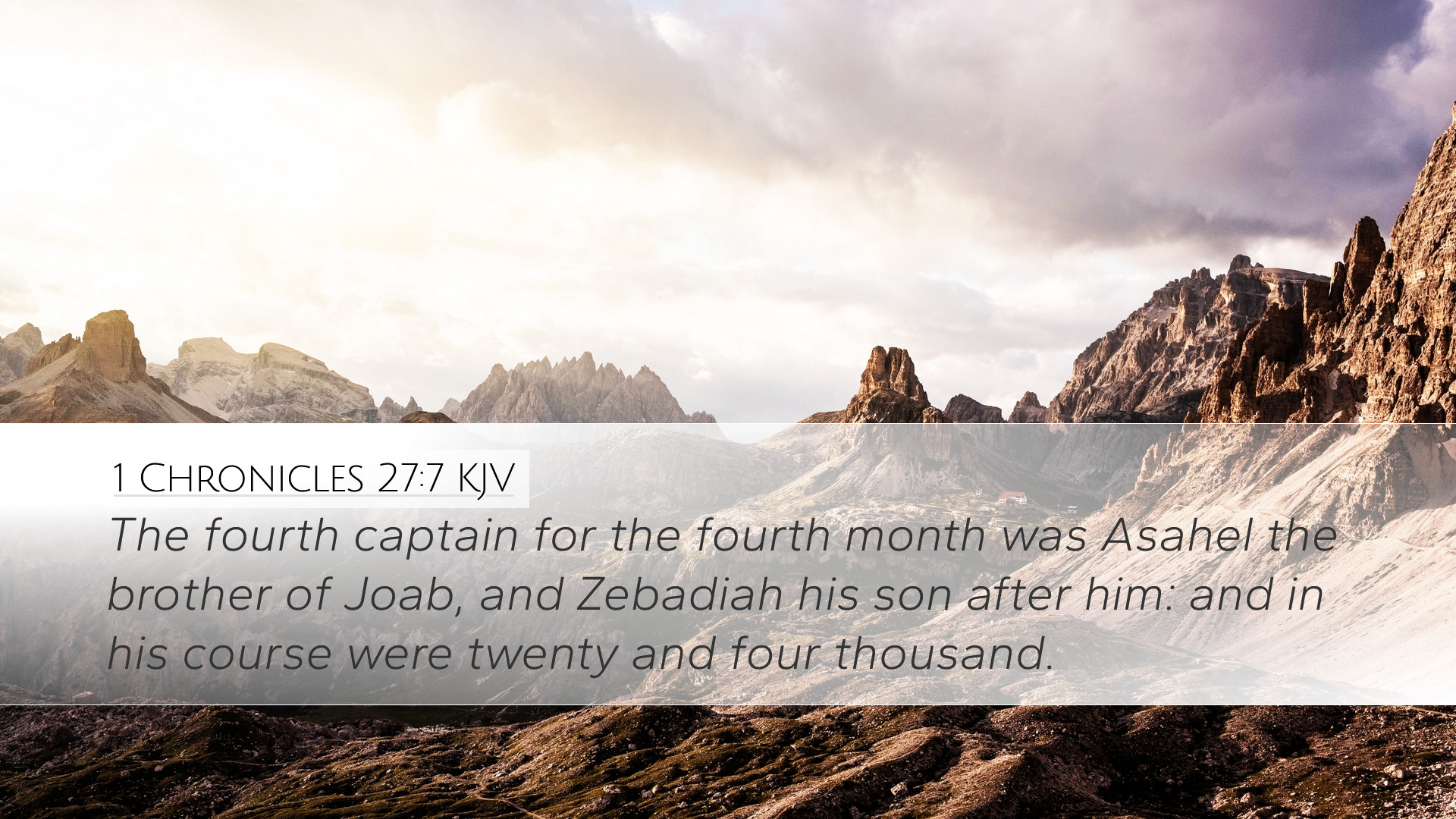Commentary on 1 Chronicles 27:7
Verse: 1 Chronicles 27:7 - "The second over the second month was Dodai the Ahohite, and of his course were twenty and four thousand."
Exegesis and Context
The context of 1 Chronicles 27 is crucial for understanding the verse. This chapter presents a detailed account of King David's organization of his military and administrative ranks. The precise enumeration of David's officers and their respective duties emphasizes order and system within his kingdom, a reflection of divinely ordained leadership.
Insights from Commentaries
The examination of Matthew Henry's Commentary reveals that the appointment of Dodai the Ahohite as the leader of the second month's course underscores the importance of military readiness and the standardization of royal forces. David's meticulous planning demonstrates his commitment to providing Israel with effective governance and defense.
Matthew Henry's Analysis
According to Matthew Henry, the arrangement of the military forces under Dodai indicates a methodical approach to governance. Each month had a leader overseeing a substantial cohort, illustrating both strategic military organization and reliance on capable leaders within Israel. Henry emphasizes that such actions reflect David’s wisdom and responsibility as a ruler. The name "Dodai" itself, meaning "beloved," hints at divine favor bestowed upon him as a leader, showcasing that God can elevate individuals to serve crucial roles in His plan.
Albert Barnes' Insights
Albert Barnes expounds on the implications of military divisions during David's reign. His commentary suggests that the division of the army into monthly courses not only ensured that the realm was protected throughout the year but also allowed for a rest period that maintained morale and operability. Barnes notes that having "twenty and four thousand" men under a single leader for a monthly rotation strengthened military efficiency and readiness which was essential in a time of constant threats and conflict.
Adam Clarke's Commentary
Adam Clarke provides additional context regarding the significance of the Ahohites, a name representing a particular lineage or clan within Israel. He underscores that the appointment of Dodai highlights the meritocratic aspect of David’s administration, where tribal lineage does not hinder a leader’s capability. Clarke interprets this verse as indicative of God’s providential guidance, as David selects leaders based on competency and loyalty rather than merely birthright.
Clarke also points to the importance of unity among the various tribes represented in the army. The inclusion of different tribes under David’s command symbolized a united Israel, reinforcing the idea that all Israel was called to participate in the protection of the nation.
Theological Implications
This verse, while historical, carries profound theological significance. It illustrates God’s order and sovereignty in establishing authority structures within His people. The careful organization by David can be seen as a reflection of God's nature; just as God is a God of order (1 Corinthians 14:33), so too is His kingdom to be orderly and effectively governed.
Leadership and Governance
In a broader application, the selection of Dodai reminds leaders today of the importance of appointing capable individuals to positions of responsibility. The criteria for leadership should focus on competency, character, and a heart for God, as seen in the biblical example. David’s appointment of Dodai can inspire leaders in the church and in secular environments to carefully choose those who lead based on their abilities and commitment to the mission, rather than other inconsequential factors.
Divine Providence
The mention of Dodai also highlights the fact that God provides leaders to accomplish His purposes. Throughout history, leaders arise not only from prominent families or backgrounds but from unexpected places. This principle encourages the church to recognize and affirm leadership in its diverse forms, reinforcing God's sovereignty in choosing workers for His harvest.
Conclusion
1 Chronicles 27:7 serves as a microcosm of God's orderly governance and the essential characteristics of effective leadership. Through the examples of Dodai and the organization of David’s military, scholars, pastors, and theologians are challenged to reflect on the principles of leadership, service, and divine guidance that permeate these verses.
In summary, this verse encapsulates themes of order, preparedness, and divine selection, urging the church to embrace structured leadership inspired by biblical models. The insights gained from Matthew Henry, Albert Barnes, and Adam Clarke collectively enrich our understanding and application of these vital truths.


